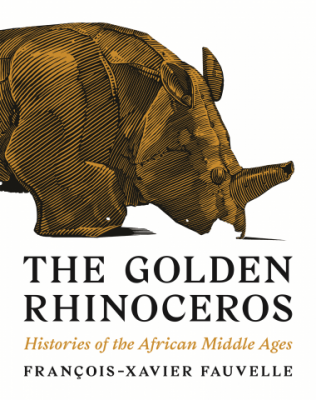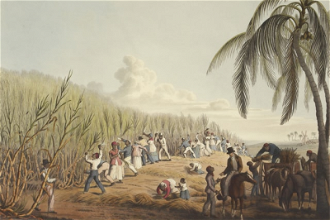Book: The Golden Rhinoceros: Histories of the African Middle Ages

The Golden Rhinoceros: Histories of the African Middle Ages, by FX Fauvelle, publisher: Princeton University Press.
Too little is known of the pre-colonial history of Africa, partly because there are almost no surviving accounts written by Africans, and partly because Europeans refused to believe there were sophisticated empires on the continent before they arrived.
This book attempts to set the record straight, with vivid descriptions of powerful kingdoms in lands we now know as Mauritania, Ethiopia, Senegal, Zimbabwe, Tanzania and Mali. But because so few ethnic groups had a written language, most of the contemporary reportage used here comes from Arab missionaries, officials and traders.
The travellers describe elaborate courts and palaces, but few traces of the buildings remain. Moreover, little attempt has been made to excavate areas where it is suspected there may be ruins of ancient African empires. For instance, in Zimbabwe there are 4,000 disused mines dating from before European colonialism. Until the end of apartheid, it was politically inconvenient for white academics in South Africa or Rhodesia to admit the Bantu people had been capable of sustaining thriving societies.
Gold and slaves were traded north, and salt came south. The Arabs described sub Saharan Africa as 'sudan', the land of the blacks. Unfortunately, it is still common for Arabs to call black Africans 'abid' or slave. In almost every chapter there is some reference to the trade in people, although the author chose not to use some of the more graphic contemporary descriptions of how many black Africans died in the caravans taking them to Arab lands. Nigerian academics believe vast numbers of men bled to death after being castrated by the Arab traders. If there is any criticism of this book, it is that it fails to convey the brutality of the slave trade, for men and women, and the scale of the business, with millions sold into appalling conditions in Arab countries.
A common and familiar theme emerges from these pages: outsiders plundering Africa for its wealth, and imposing their religion on local people. It is evident from these accounts that Europeans were not the first colonisers: the Arabs were present from the sixth or seventh century onward. Muslim missionaries concentrated in converting African elites, rather than their subjects. They also focused their efforts on the cities, meaning that rural areas kept to their traditional beliefs until the Christians arrived. They also brought a global language, Arabic, opening up relatively easy trade opportunities for the Arabs.
The author points out that there is evidence of Chinese, Afghan and Indian goods being traded in Africa from the sixth century onward. Next time a politician denounces free trade and migration, we should bear in mind that history is not on their side. We humans have been interconnected for a very long time. As this book makes clear, it has allowed ideas to circulate, to almost everyone's benefit.
For more information, see: https://press.princeton.edu/titles/13228.html

















